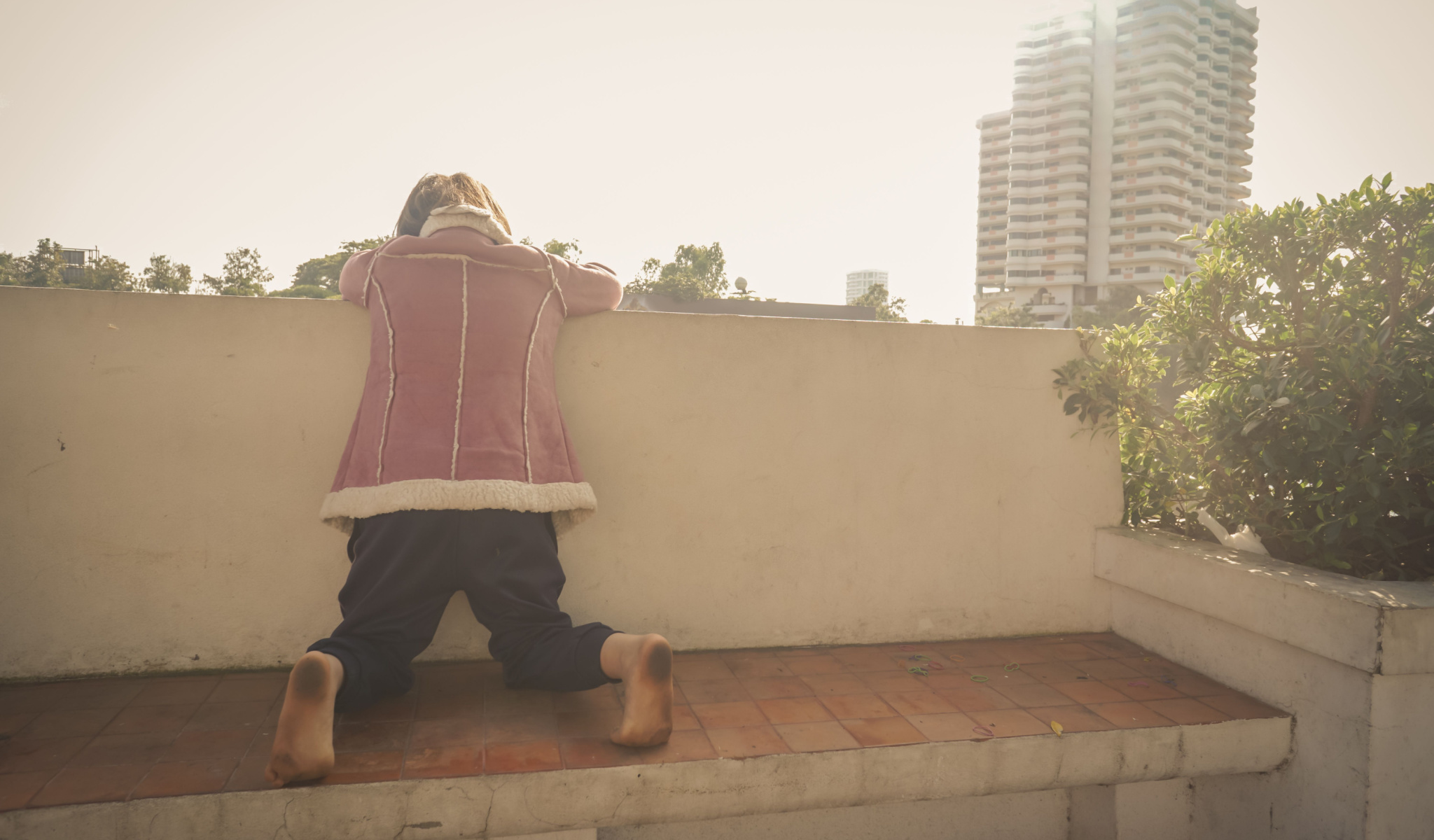
The New York Times published an op-ed over the weekend entitled ”The Startling Evidence of Learning Loss Is In.” Here’s the second paragraph:
The evidence is now in, and it is startling. The school closures that took 50 million children out of classrooms at the start of the pandemic may prove to be the most damaging disruption in the history of American education. It also set student progress in math and reading back by two decades and widened the achievement gap that separates poor and wealthy children.
For anyone who has been paying even a modest amount of attention for the past 3 ½ years, the evidence is anything but startling.
People often ask me, and even more so since this “startling” piece hit the digital airwaves: “Don’t you feel redeemed?”
In fact, it’s hard to describe how angry this “revelatory” piece of writing makes me. More than 3 years too late, the New York Times has now given permission to acknowledge what was obvious from the beginning. But if you dared to say so in 2020, or 2021, or even 2022, you were smeared with all sorts of career-ending ad hominem attacks, including but not limited to: racist, eugenicist, ableist, science-denying alt-right Trumper, flat earther and sometimes Nazi.
So no. I don’t feel grateful that the New York Times has finally deemed this subject acceptable to talk about when the damage has already been done to both American children and those dissenters who challenged the fear-mongering, and data-denying mainstream narrative with actual science and facts.
Furthermore, this “journalistic” outfit fails to acknowledge their own complicity in these devastating results.
It was clear what would happen all along, but the New York Times failed to interrogate the issue and instead published “the science” as determined by Big Pharma press releases, teachers’ unions, and government leaders cowing in the face of public health bureaucrats.
My first writing on the subject was this in February 2021, but I had started pushing back from day one — March 2020 — in my own community, on news programs, on social media, and with open schools rallies, like the one pictured here from December 2020.
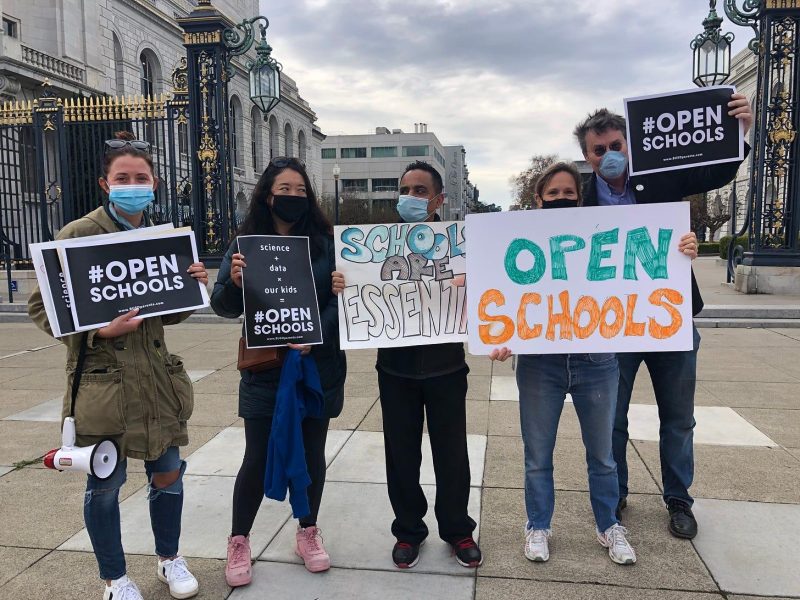
There were times I felt like I was going insane because it was all so patently clear what was happening and would only be made worse the longer schools stayed close: the learning loss; the disengagement from education overall; the depression and anxiety and suicidality due to severe isolation (often summarized as “mental health impacts”); the chronic absenteeism that would inevitably come because when you tell kids that their education isn’t important – isn’t a societal priority – well, they will believe you; the dropout rates; the graduating without being able to read; the abuse at home; the loss of community and hope.
But the more we sounded the alarm bell the more we were demonized.
Unsurprisingly, the poorest, most vulnerable children were harmed the most. Which is also clearly what was going to happen from the outset if you exercised even a modicum of common sense. Because, despite the wealthy hordes in Los Angeles and New York City shrieking about how We’re all in this together! –from their fancy balconies in the Hollywood Hills and the acreage of their Montana vacation homes — they also hired private tutors and formed learning pods with hired help to guide their kids and make sure they stayed on track. And, their children returned to their $60k a year private schools in the fall of 2020, a year before those who couldn’t afford the luxury of in-person education.
It was poor and low-income children who were left home alone to navigate “Zoom school” while their parents worked hourly wage “essential” jobs. And it was poor and low-income children left home to take care of younger siblings. Or find community – and trouble – outside of school. It was poor and low-income children who missed meals by not being in school, who didn’t have WIFI that worked, who didn’t have adult intervention and oversight that happens in school.
But no child was immune to the impacts. Just when adolescents are meant to be individuating from their parents, they were forced to be at home, alone, relying on screens for any sense of connection to their peers. They missed out on proms, football games, debate club, youth sports, graduations, and all of the small everyday milestones that make a teen’s life. And they were given no hope that it would ever end because it just kept going and going. In some states students experienced disruption to their schooling for as long as 19 months.
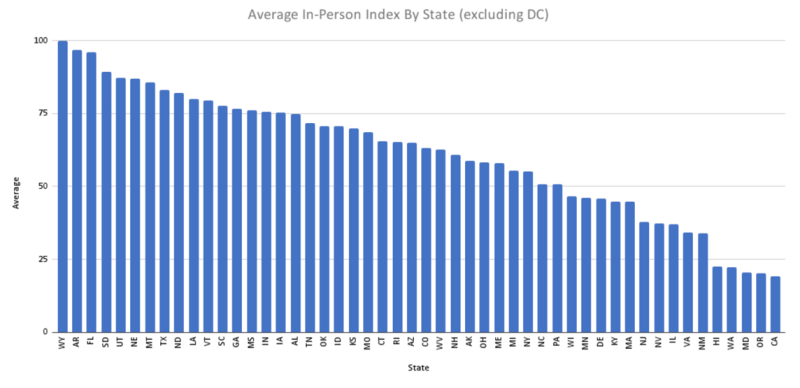
And even then, when they finally returned to school full time, they suffered under onerous restrictions including masking, distancing, testing, periodic closures, and no extra-curricular activities.
Furthermore, young people were made to feel like horrible monsters if they struggled with this isolation. They were called selfish grandma killers if they yearned for their friends or wanted to celebrate their graduations. They were made to feel shame for being human. Is it surprising that record numbers of young people were thrown into depression, anxiety, eating disorders, suicidal ideation, drug use, and sometimes, even suicide?
It’s nice that the New York Times has caught on now. But in this accurate oh-so-too-late piece, they fail to acknowledge their own complicity in extending and furthering the devastating, ineffective, and morally abhorrent school closures during 2020-2021, with restrictions to children continuing for more than a year after schools actually opened everywhere in the Fall of 2021.
They elevated the voices of those who furthered fear with a schools needs to be closed or else all the children and teachers will die hysteria.
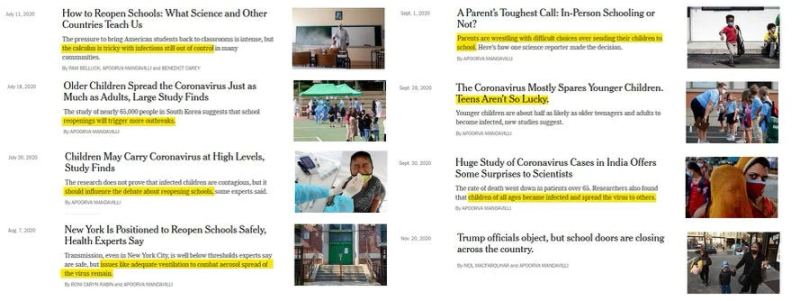
Science reporter Apoorva Mandavilli persistently stoked fears about the danger of Covid to children and downplayed the significant risks of keeping them at home, “learning” on screens, isolated from their peers.
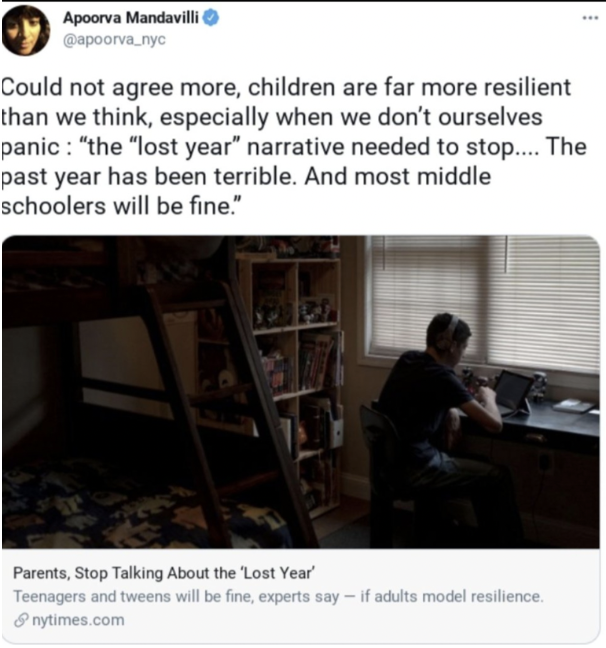
In October 2021, just as children across the country were heading back to school, Mandavilli exaggerated the number of children hospitalized for Covid by 14x, or 837,000 cases.
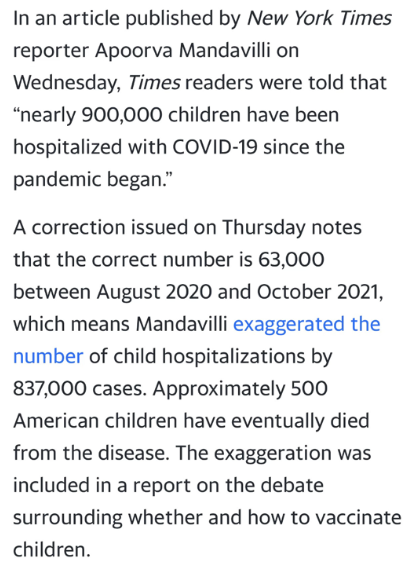
She continued to stoke unwarranted fear just when kids were going to get a semblance of their lives back, at a time when adults had been going to bars and dance clubs and sports stadiums for over a year.
Was her intention to encourage school districts to shut down again? Who knows. Certainly, she got the numbers way way wrong. She was so caught up in the fear-furthering hysteria — having participated in it for a year and a half at that point — she must have lost the ability to count.
Certainly, there was ample evidence that kids were at little to no risk, nor had they been since the very beginning. But any suggestion — with data cited — that Covid was not in fact dangerous to kids, was deemed “Covid denialism” by Mandavilli.
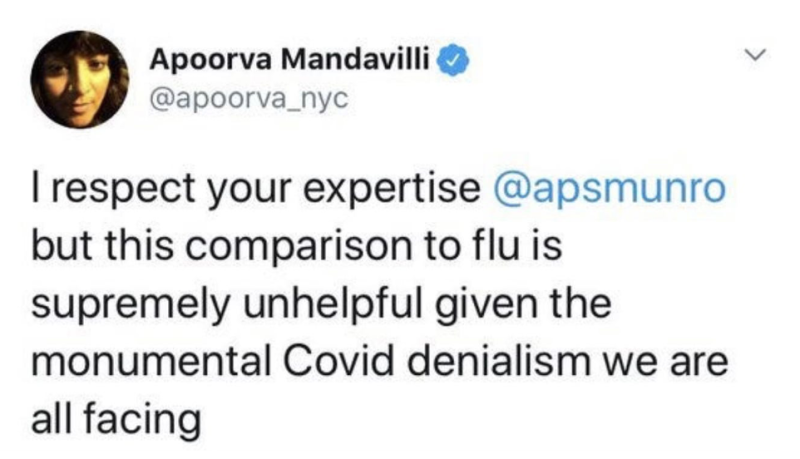
This is a science reporter for the New York Times, folks, not some Twitter rando. Her articles and Tweets carried real weight and influence.
The New York Times failed to interrogate the issue of closed schools during Covid in real time. They platformed fear-mongers and silenced, vilified, or just ignored dissenters, which included renowned doctors and scientists who dared to challenge the mainstream narrative like those featured in the pages of this publication.
The New York Times consistently published government and Big Pharma issued press releases as if they were journalism. They platformed the spokespeople of these entities and their paid influencers furthering unwarranted fear and packaging it as “the science.”
If a normie like me could read and interpret the data available since March 2020 and know that not only would closed schools be incredibly harmful to the most vulnerable children, but that their risk from Covid was thousands of times less than an elderly person, then certainly the science desk at the New York Times should have been able to do so.
Simply pushing the narrative that “everyone was at equal risk” was journalistic malpractice.
The news organization needs to go so many steps further than this op-ed.
They need to apologize for their untruthful, damaging reporting which gave cover to government leaders in refusing to open schools and teachers’ unions in refusing to return their members to the classroom.
They need to apologize for smearing those of us who challenged. We didn’t just suffer reputational harm and hurt feelings. We lost friends, our communities, our jobs, in some cases. And our voices were not part of the necessary societal discussion that needed to happen but didn’t. Because the New York Times presented one viewpoint — kids are at terrible risk and schools need to stay closed — as the undisputed “science.” As inarguable fact. Anyone who dissented was clearly an insane, selfish, and very dangerous lunatic.
Lastly, after apologizing to both the children harmed and the dissenters dragged through the mud, the New York Times needs to pursue this story relentlessly. So that children get the help they so desperately need and deserve.
And so that it never happens again.
Disclaimer
Some of the posts we share are controversial and we do not necessarily agree with them in the whole extend. Sometimes we agree with the content or part of it but we do not agree with the narration or language. Nevertheless we find them somehow interesting, valuable and/or informative or we share them, because we strongly believe in freedom of speech, free press and journalism. We strongly encourage you to have a critical approach to all the content, do your own research and analysis to build your own opinion.
We would be glad to have your feedback.
Source: Brownstone Institute Read the original article here: https://brownstone.org/

